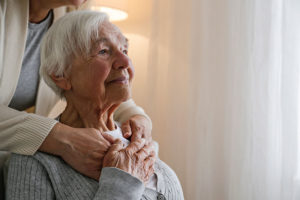
Is an older adult you love struggling with socializing, sleeping well or enjoying activities, or experiencing memory problems? Before chalking it up to the common effects of growing older, consider another common culprit: anxiety.
In addition to these symptoms, anxiety in seniors can display through:
- Repetitive behaviors, such as handwashing
- Overreactions to whatever is triggering symptoms
- Obsessive thinking
- Nightmares
- Physical effects such as heart palpitations, trembling, nausea, sweating, and more
While there isn’t always a known cause for anxiety in seniors, it’s believed to be impacted by a variety of situational and environmental factors common to aging, including:
- Childhood trauma
- Health and mobility complications
- Grief
- Loss (or perceived loss) of independence
- Medication side effects
- And more
Common Types of Anxiety in Older Adults
Though a generalized anxiety disorder is often diagnosed, solving the question of aging or anxiety, there are some more specific types of anxiety problems that are common in seniors, including:
- Phobias: Phobias are fears pertaining to a certain item or circumstance. For example, someone may experience heightened anxiety only if facing medical appointments or procedures, thunderstorms, insects, heights, etc.
- OCD: OCD, or obsessive-compulsive disorder, drives a person to perform repetitive actions in order to control unwanted thoughts or compulsions. This gives a sense of control in an otherwise uncontrollable situation. The individual may feel the need to be sure the oven is turned off multiple times or count the number of tiles on the floor before leaving the house.
- Social anxiety disorder: This type of anxiety is displayed by extreme feelings of self-consciousness or nervousness in social situations. It may cause an individual to avoid socializing, limiting their ability to make and keep connections with others.
How Can You Help a Senior With Anxiety?
The first step is scheduling an appointment with the senior’s primary care physician. There are effective treatment options, from prescription medications to counseling and changes in lifestyle. You can also:
- Provide the person with a lot of opportunities to talk. Knowing they can trust you with their thoughts and feelings, without concern about judgment, can be extremely helpful and freeing.
- Encourage them to get plenty of sleep every night. Lack of sleep can increase anxiety by as much as 30%, according to a research study performed by the University of California, Berkeley.
- Help the person understand the need to avoid caffeine, nicotine, alcohol, and other stimulants, that could exacerbate anxiety.
Independence-4-Seniors Home Care is here to help as well. A caregiver makes a great companion for a senior to talk to and engage with calming, enjoyable activities. We can also prepare nourishing meals, encourage the utilization of stress management techniques, and much more. Contact us at 630-323-4665 or contact us online for information on how we can help someone you love.
